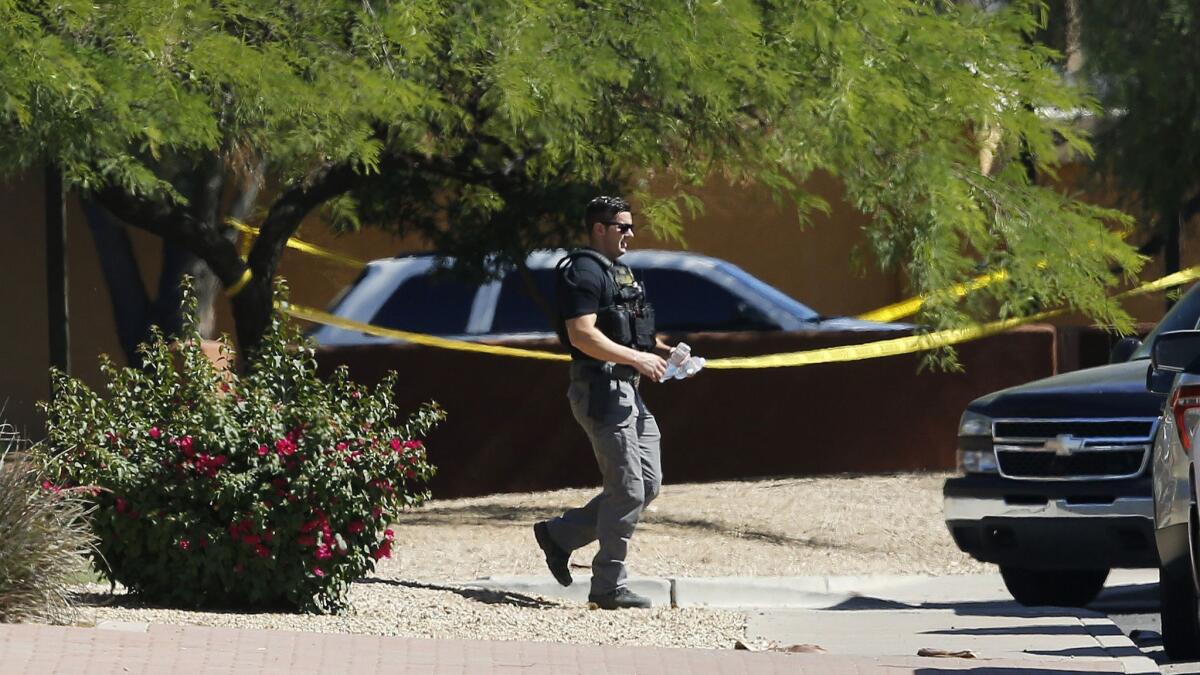Arizona counselor who survived rampage: ‘I was his target.’ And she was not surprised

Even though the Scottsdale, Ariz., office where they worked was small, the two mental health experts didn’t know each other well.
Karen Kolbe, a licensed professional counselor, ran her own practice, and she leased out space to Marshall Levine, a psychiatrist who specialized in hypnotherapy. Therapy work tends to happen behind closed doors, so the pair mostly saw each other between sessions.
Kolbe liked Levine’s laid-back attitude. On Friday, before leaving work, Kolbe thought: Levine’s the perfect tenant. Such a sweet guy.
Only hours later, around 3 a.m., police arrived at Kolbe’s house: Levine’s body had been found at the office, an officer told her. He had been shot.
The killer, police later said, was Dwight Lamon Jones, 56, who was in the middle of a four-day rampage in which he shot and killed six people across the Phoenix area. Jones shot and killed himself early Monday as police surrounded his Scottsdale hotel room, officials said.
As the violence was unfolding, investigators struggled to find a pattern connecting the victims — apart from the gun that had been used. But the moment she first heard police consider Jones as a suspect, on Sunday, “the dots connected immediately,” Kolbe said in a phone interview Tuesday.
Levine, her slain tenant, didn’t have anything to do with Jones, she said. “I was his target,” Kolbe said.
Jones, police said, appeared to be carrying out a long-held vendetta against mental health and legal professionals involved in his divorce case nearly a decade ago — a group that included Kolbe.
Jones’ then-wife filed for divorce in 2009 after he threatened to kill her, in front of their son, in an incident that ended with his arrest, according to court records. She also obtained a protective order against Jones, who was also institutionalized for a psychiatric evaluation.
Jones’ first victim, Steven Pitt, killed Thursday, was a nationally renowned psychiatrist who had testified in the proceedings that Jones likely had anxiety disorder, mood disorder and features of antisocial, narcissistic and paranoid personality disorder.
Without psychiatric help, Jones “is going to continue to unravel,” Pitt said, according to a 2010 court document from Jones’ divorce. “He will become increasingly paranoid, likely psychotic, and pose an even greater risk for perpetrating violence.”
Jones ended up losing custody of his son when a judge finalized the divorce. Jones’ ex-wife hired Kolbe at some point during the proceedings to give their son professional counseling, because he had been traumatized by his parents’ relationship, the counselor said.
Kolbe never met Jones, but she remembered speaking to him once, by phone or text, she said.
“He was sort of demanding that he get an appointment with me,” Kolbe said. “It was more, ‘You have to talk to me,’ and that felt very threatening, and there was no way I was going to do that.”
Jones had behaved well during monitored sessions with his son, and he had taken 36 weeks of domestic violence classes while on probation, according to a 2011 court filing.
Criminal case records involving Jones could not be immediately located by The Times in Maricopa County Superior Court. A representative for the Scottsdale police records department confirmed having four arrest reports under Jones’ name, but declined to say what the arrests were for.
As of 2011, Jones apparently hadn’t received mental health treatment; he told court officials that no therapist was willing to work with him. It’s unclear whether he ever received treatment.
Kolbe said therapists are often reluctant to take on cases that involve what she described as a volatile parent, which can lead to subpoenas and court cases — or worse. “More and more therapists are like, ‘I don’t need that in my life,’” she said.
Jones’ ex-wife had warned her that Jones was dangerous, Kolbe said. “She was trying to tell everybody, ‘Please take me seriously,’” Kolbe said, adding, “I knew it would haunt me” to get entangled with a family battle involving Jones.
“The way I describe it to people is, everybody who does any mental health work — or attorneys — we all have those couple of cases in our mind: ‘What’s the worst, scariest thing you’ve ever worked on?’” Kolbe said. “This was it.”
The ex-wife, Connie Jones, and her son were unharmed in the violence of the last several days.
“He was a very emotionally disturbed person, as the court records will confirm,” she said in a statement Monday. “Personally, I have feared for my safety for the past nine years.”
Two of Jones’ other victims, slain Friday, were paralegals named Veleria Sharp and Laura Anderson, who worked at the same law firm as a family-law attorney named Elizabeth Feldman.
When Kolbe heard about those deaths, she wondered: “Elizabeth Feldman — where do I know that name from?”
After police identified Jones, it clicked. “She was the mom’s attorney,” Kolbe realized.
Feldman’s firm said in a statement on its website that it was deeply saddened by the paralegals’ deaths. Anderson’s “intellect, passion and friendship has meant more to us than we can even begin to convey,” and Sharp “brought joy, calmness, warmth and compassion to all that she did.”
Scottsdale police, who took the lead on the multi-agency investigation into the killings, said Tuesday that they were investigating the relationship between Jones and his final two victims, Mary Simmons and Bryon Thomas of Fountain Hills, who appear to have been killed Sunday.
Investigators have not released any information about the gun used in the slayings or whether Jones had it legally. “That is still part of the investigation,” Scottsdale police spokesman Ben Hoster said in an email.
Kolbe said she was “absolutely appalled at the state of gun availability” in Arizona.
“This guy was not a mystery, and I think that’s an important piece here,” Kolbe said. “How much more information do you need about somebody to know they’re a threat?”
Matt Pearce is a national reporter for The Times. Follow him on Twitter at @mattdpearce.
More to Read
Start your day right
Sign up for Essential California for news, features and recommendations from the L.A. Times and beyond in your inbox six days a week.
You may occasionally receive promotional content from the Los Angeles Times.






